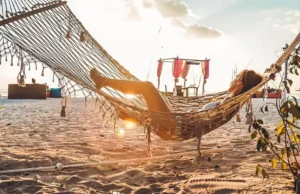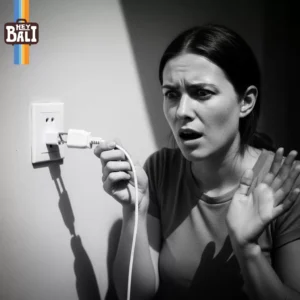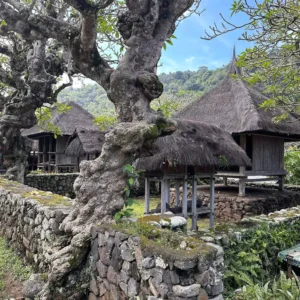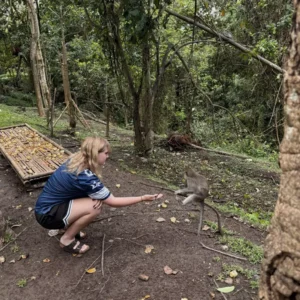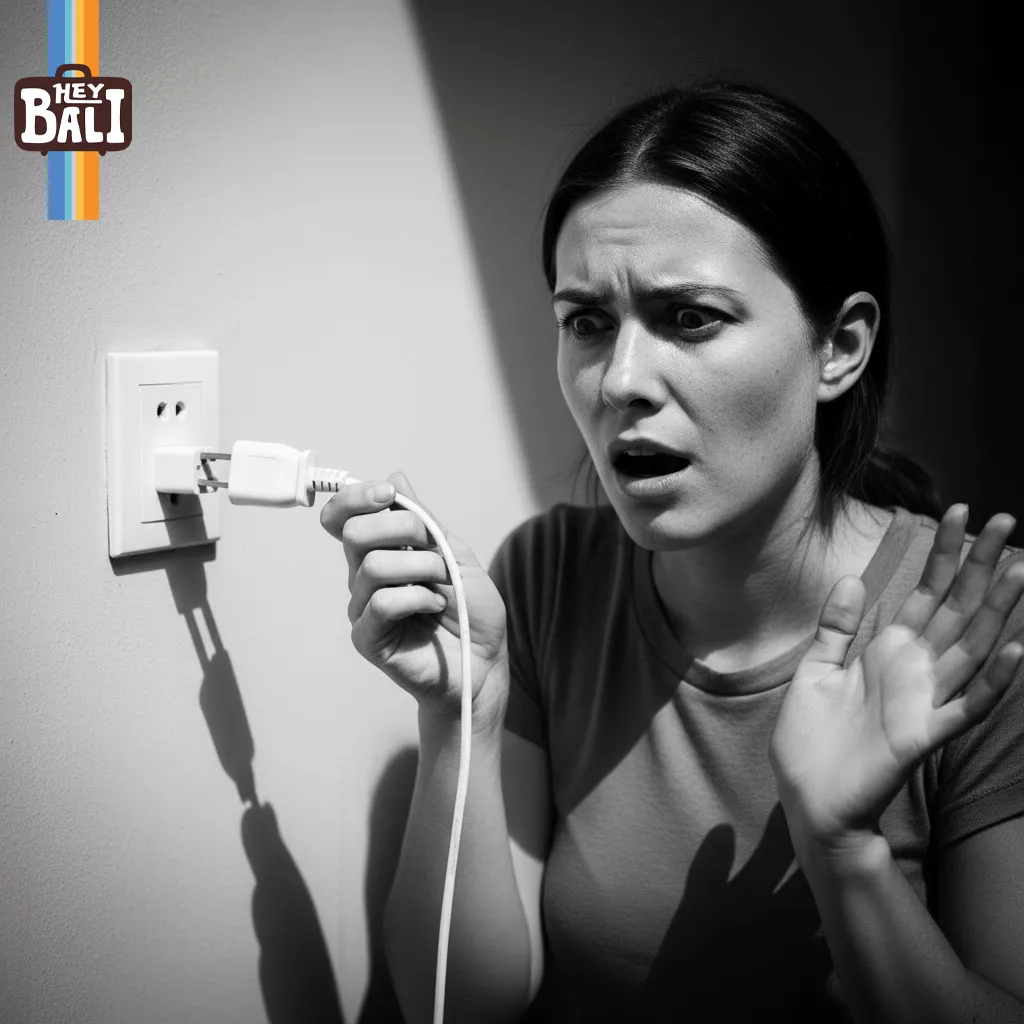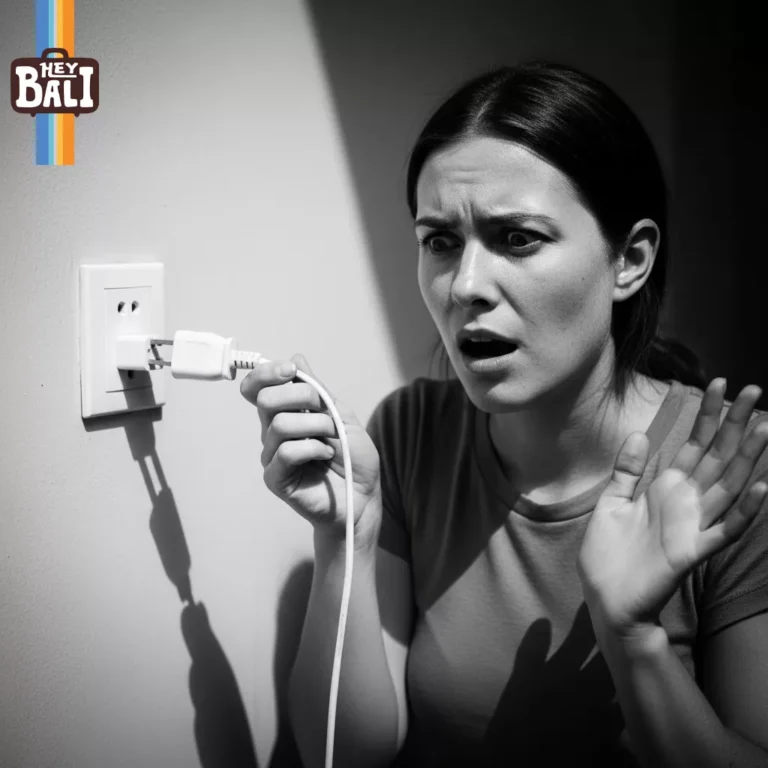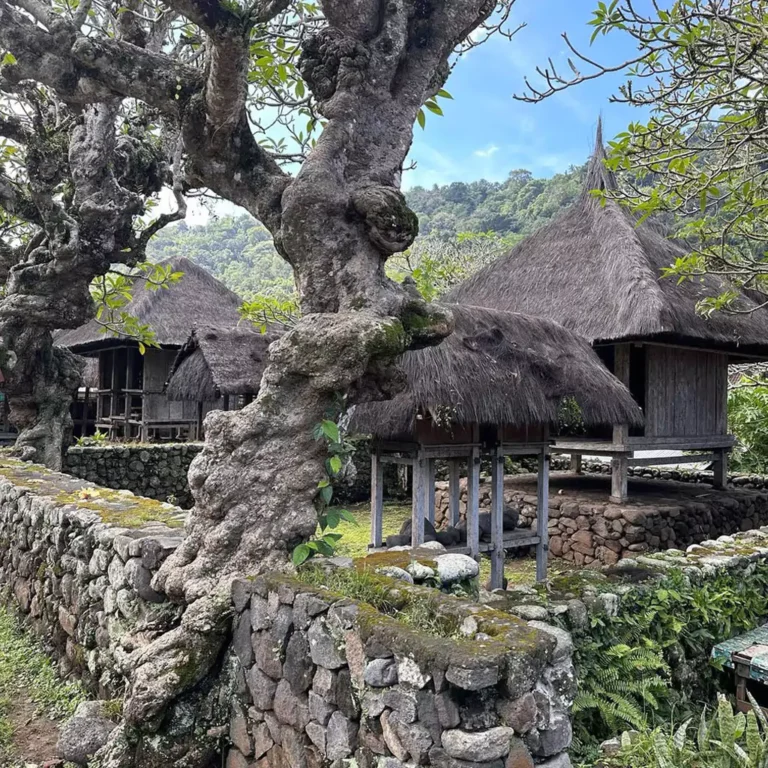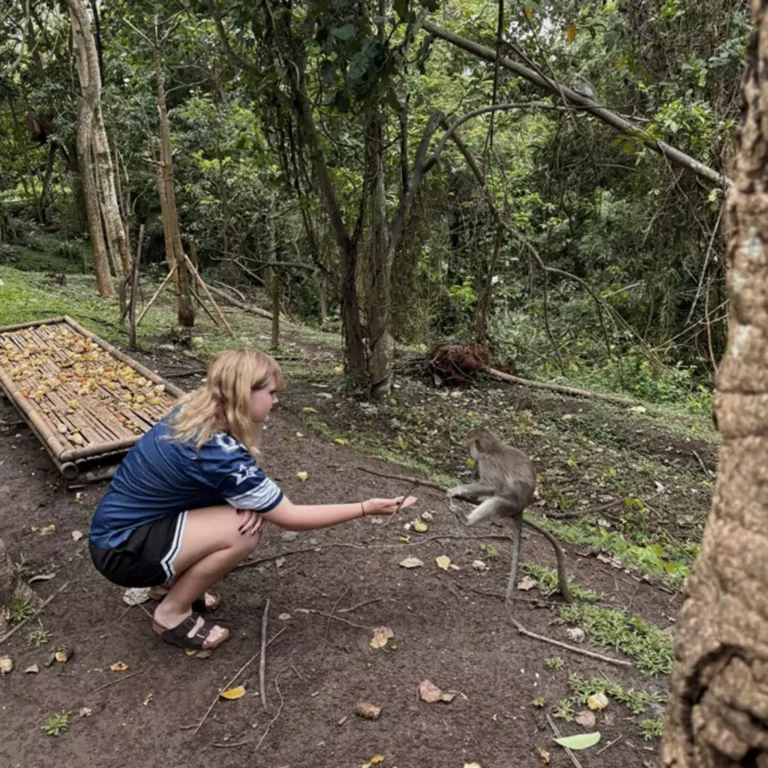Chapters
ToggleThe Shocking Truth About Bali Wall Socket
“You’ve just checked into your villa, you plug in your laptop, and suddenly… a spark of regret. That little ‘pop’ you hear isn’t just the sound of your charger dying – it’s the sound of your digital nomad dreams short-circuiting.”
Welcome to Bali, where the wall sockets don’t care about your Instagram followers or your startup valuation. Every day, tourists arrive convinced their universal adapter will work, only to discover that:
- Their flat-pin plugs stare hopelessly at Bali’s round holes
- That “universal” adapter from Amazon is anything but
- Their hair straightener now doubles as a modern art sculpture
Here’s the hard truth: Bali’s electrical system (230V) will happily turn your expensive gadgets into expensive paperweights if you get it wrong.

But here’s the good news: This isn’t rocket science. In the next 3 minutes, we’ll show you exactly what plug works in Bali and how to avoid becoming another “melted adapter” horror story.
At Hey Bali, we’ve seen every kind of adapter disaster – from smoking chargers to laptops that permanently vacationed in gadget heaven. We’re here to make sure your only shock in Bali comes from the price of avocado toast.
〰️🌀〰️🌀〰️🌀〰️
2. Bali Wall Socket 101: What You’re Actually Looking At
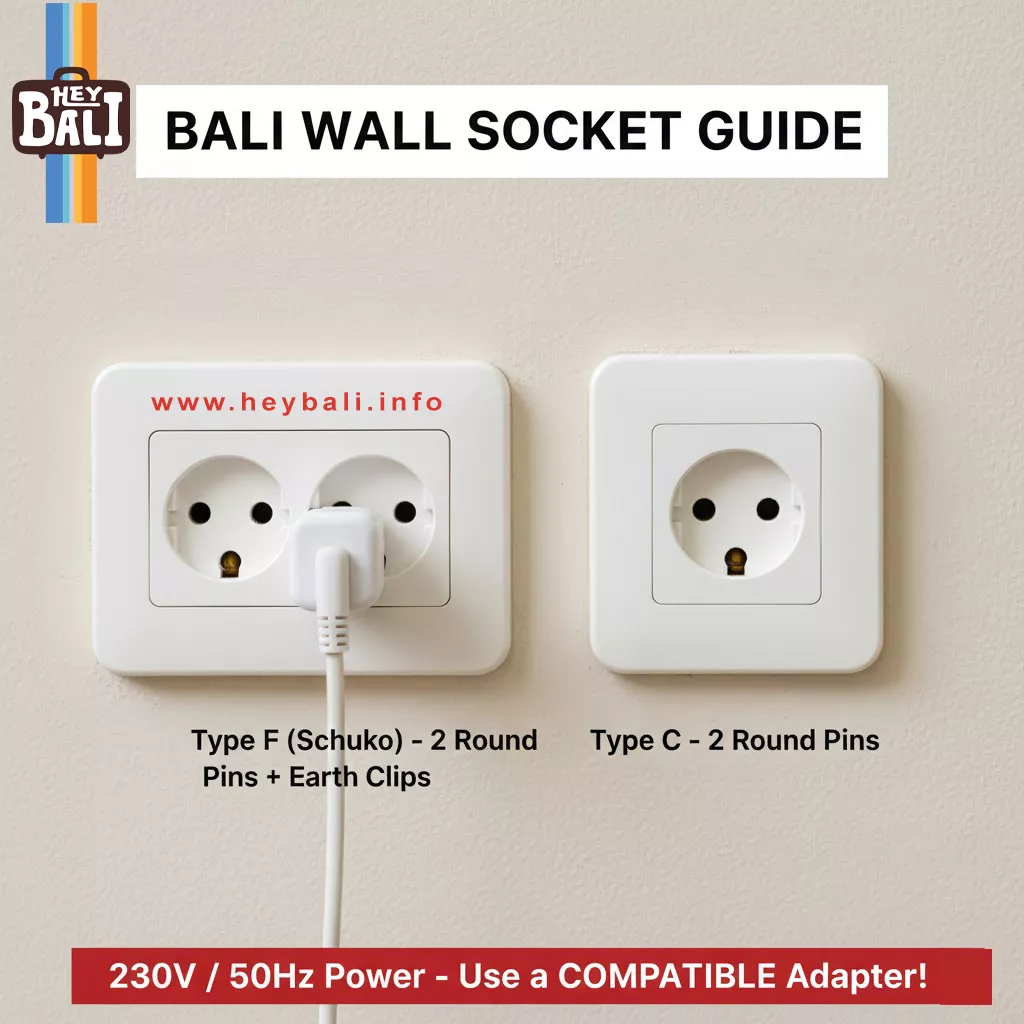
What Plug Works in Bali? It’s All About the Round Holes.
Alright, let’s get visual. Forget complex technical drawings. When you’re staring at a Bali wall socket, you’re almost certainly looking at one of these two characters:
- Type C (The Common One): Two round holes. Simple. Classic. This is your go-to Bali power outlet.
- Type F (The Grounded Upgrade): Also two round holes, but with two metal grounding clips on the top and bottom.
Here’s the good news: If your plug has two round pins, it will fit into both Type C and Type F sockets. So, when you’re figuring out what plug works in Bali, just remember: round pins = you’re golden.
Now, For the Real Gadget-Killer: Voltage.
This is the part everyone skips until it’s too late. Pay attention.
- Bali Voltage: 230 Volts (V)
- Frequency: 50 Hertz (Hz)
Let’s translate that into plain English: The electrical current in Bali is nearly twice as powerful as in North America (120V) and Japan (100V).
Think of it this way: A Bali wall socket doesn’t just deliver electricity; it delivers it with attitude. Plugging a device that’s not built for that into the wall is like forcing a gentle stream through a fire hose—something is going to break.
But don’t panic just yet. The solution is simpler than you think.
👍 Read : What Plug Do I Need for Bali? A Traveler’s Quick Guide
〰️🌀〰️🌀〰️🌀〰️
3. Adapter vs. Converter: Don’t Buy the Wrong Thing – Bali Wall Socket
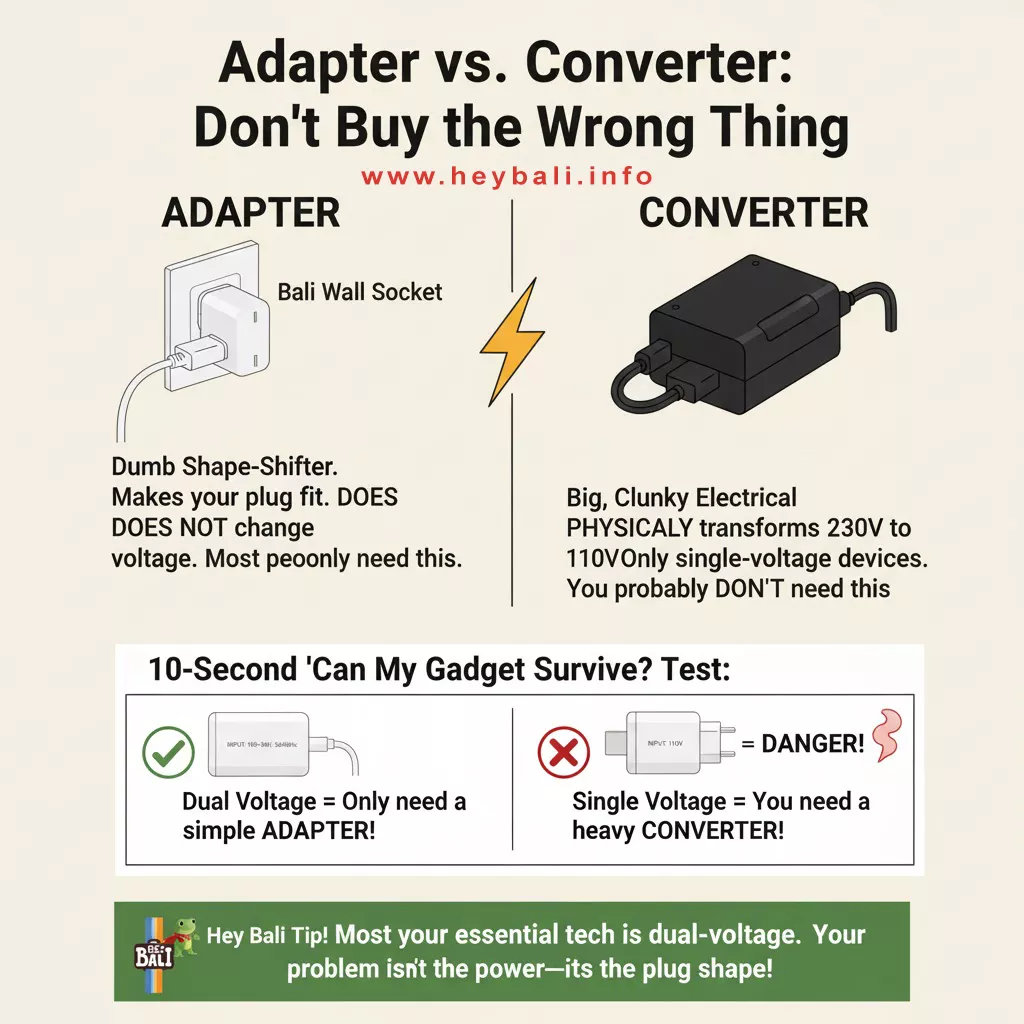
What Plug Works in Bali? Usually, Just an Adapter.
Let’s cut through the confusion. Most people think they need a “voltage converter” for Bali. Ninety percent of you are wrong. Understanding the difference between an adapter and a converter will save you money, luggage space, and your favorite gadgets.
Here’s the simple breakdown:
- An adapter is a clueless shape-shifter.. It’s a chunk of plastic and metal that makes the prongs of your plug fit into the Bali wall socket. It does NOT change the electrical current. This is what almost everyone actually needs.
- A CONVERTER is a big, clunky, expensive electrical bodyguard. It physically transforms the 230V from the wall down to a safer 110V for appliances that can’t handle the power. You probably don’t need this.
The 10-Second “Can My Gadget Survive?” Test:
Look at the charger brick for your laptop, phone, or camera. Find the tiny writing that says “INPUT:”.
- If it says “INPUT: 100-240V, 50/60Hz” → Congratulations! Your device is a worldly citizen. It can handle Bali’s voltage. You only need a simple adapter to make it fit the local power outlet.
- Examples: Modern laptops, smartphones, cameras, power banks, DSLR chargers.
- If it says “INPUT: 110V” or “120V” only → Red Alert! This device thinks it’s still in America. Plugging it directly into a Bali wall socket with just an adapter will give it a fiery death. You need a heavy (and expensive) voltage converter.
- Examples: Cheap hair straighteners, old hair dryers, certain kitchen appliances from the US.
The Hey Bali Bottom Line: Most of your essential tech is dual-voltage. Your problem isn’t the power—it’s the plug. So, before you waste money on a converter you don’t need, do the 10-second check.
👍 Read : The Traveler’s Guide to Bali Adapter Plugs: Types, Tips, and a Free Offer
〰️🌀〰️🌀〰️🌀〰️
4. 3 Things to Check Before Your Adapter Betrays You – Bali Wall Socket
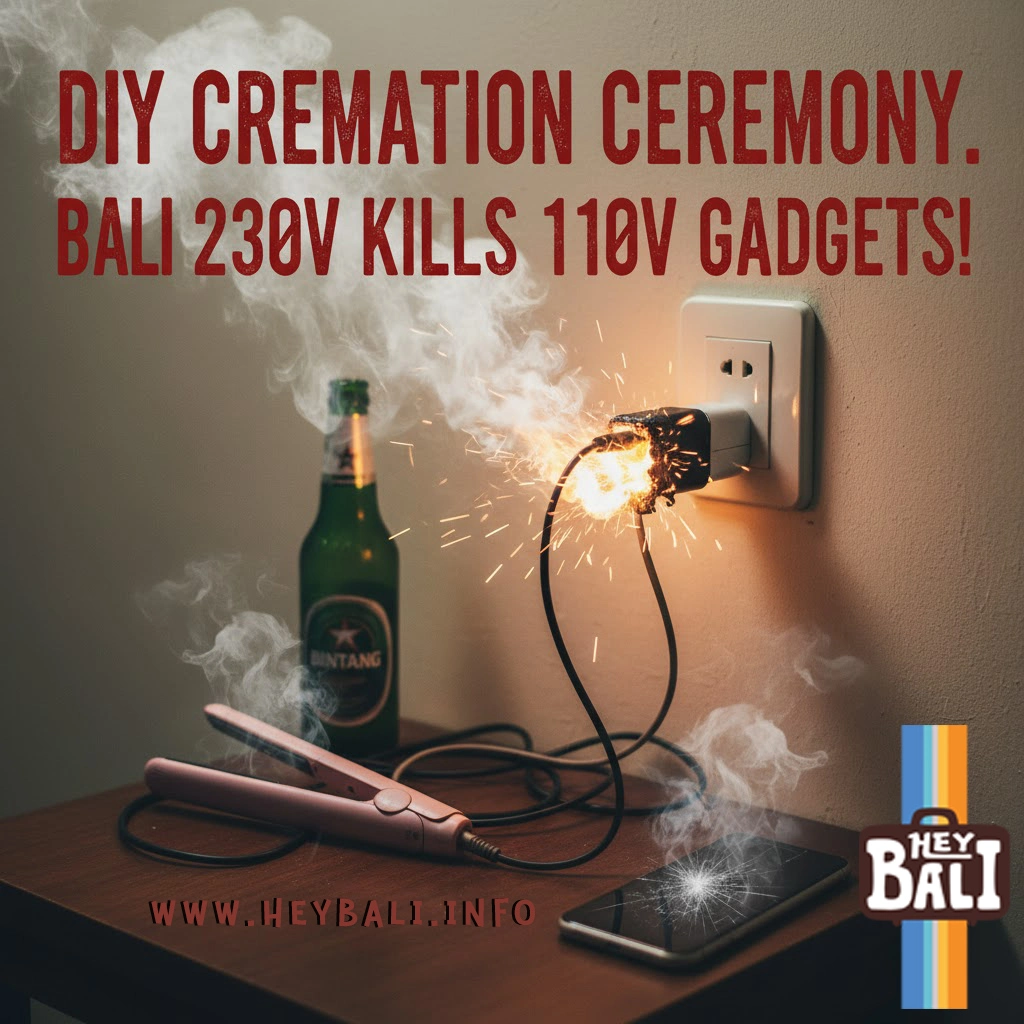
Buying a Bali Travel Adapter? Don’t Get Scammed.
So you know you need an adapter. But walking into a Bali shop or scrolling through Amazon reveals a wall of nearly identical plastic bricks. How do you choose the one that won’t fail you? Ignore the marketing fluff. Here are the only three things that truly matter.
Check #1 – Plug Compatibility: It’s All About the Pins
This should be obvious, but you’d be surprised. The adapter must have round pins (Type C, E, or F). If it only has flat, vertical pins (Type A/B – common in the US/Japan), it’s useless for a Bali power outlet. Many “universal” adapters have a mess of different pins; make sure the round ones are there and feel sturdy.
Check #2 – Build Quality & Safety: Your Firewall Against Disaster
This is non-negotiable. That 50k adapter from a market stall? It’s a fire hazard, not a travel accessory.
- Feel the Weight: A good adapter has some heft. Cheap ones feel hollow and are made of flimsy, flammable plastic.
- Check for Certifications: Look for engraved logos like CE, FCC, or RoHS. These are your only proof that it’s been tested for basic safety. No logos? No sale.
- Inspect the Pins: They should snap in and out firmly. Wobbly pins lead to poor connection, sparking, and melted sockets.
Check #3 – Bonus Features (That Are Actually Essential)
- Multiple USB Ports: You have a phone, power bank, and maybe a tablet. An adapter with both USB-A and USB-C ports lets you charge them all from one Bali wall socket, saving precious outlet space.
- Surge Protection: Bali’s power grid can be… enthusiastic. Surge protection acts as a buffer against voltage spikes that can quietly fry your electronics. It’s cheap insurance.
- Compact Size: Balinese sockets are often hidden behind beds, desks, or nightstands. A bulky adapter might not fit. A slim, low-profile design is a practical necessity, not a luxury.
Don’t just grab the cheapest option. Your gadgets are worth more than the savings.
👍 Read : Adapter vs Converter Bali: The Power Struggle No One Warned You About
〰️🌀〰️🌀〰️🌀〰️
5. The Easiest “Hack” for Bali’s Wall Sockets

Your Bali Power Outlet Solution is Simpler Than You Think
Let’s recap. To conquer the Bali wall socket, you need an adapter that has:
- The right round pins.
- Solid build quality with safety certifications.
- Useful bonus features like multiple USB ports.
You could spend hours researching, comparing prices, and still end up with a dud. Or… you could skip the entire circus.
Here’s the simplest solution to your Bali travel adapter problem:
We at Hey Bali got tired of seeing travelers get ripped off. So we sourced a premium, safe, and feature-packed adapter that meets all the criteria above.
And we’ll give it to you for FREE.
No catch. No need to book a tour or rental with us. We’re not that kind of company.

Here’s all you need to do:
- Message us on WhatsApp at +62 811-281-407 to reserve your adapter.
- Choose to pick it up from our office or have it delivered (a small delivery fee applies for shipping).
- Enjoy Bali with a reliable power solution and one less thing to worry about.
100% Free. Because helping doesn’t need a reason.
Stop stressing about what plug works in Bali. We’ve solved it for you. Now you can focus on what really matters—like which waterfall to visit first.
〰️🌀〰️🌀〰️🌀〰️
6. Bali Wall Socket FAQ (No Nonsense Answers)

You’re looking at two round holes (Type C) or two round holes with two metal grounding clips on the side (Type F). If your plug doesn’t have two round pins, it’s not going in.
Sure, if you’re looking for a spectacular light show and a dead gadget. The physical shape is wrong and the voltage is incompatible. You NEED an adapter.
Almost certainly not. Check your charger. If it says “INPUT: 100-240V” (which it does), your device is dual-voltage. You just need a simple physical adapter for the Bali power outlet, not a converter.
You have two smart options: 1) Go to a reputable electronics store. 2) Get a guaranteed, high-quality one for FREE from Hey Bali. The worst place is a random tourist market stall selling uncertified fire hazards.
👍 Read : 5 Things to Check Before Your Bali Power Adapter Betrays You
〰️🌀〰️🌀〰️🌀〰️
7. Conclusion: Your Bali Power Solution Is Here – Bali Wall Socket
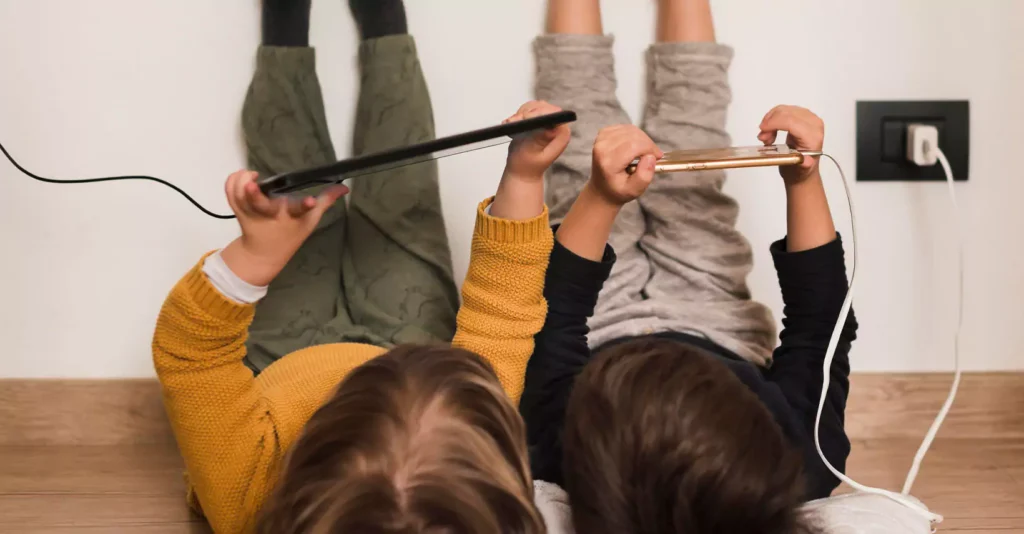
Let’s be crystal clear:
- Bali wall socket = round holes, 230V power
- Your gadgets = need proper protection
- The solution = simpler than you think
Here’s Our Free Gift to You:
We’ll give you a premium, safety-certified Bali adapter – completely FREE. No tours to book, no rentals to arrange. Just a quality adapter that won’t melt, spark, or fail you.
Why? Because we’re tired of seeing tourists get ripped off by market stall fire hazards. Because your vacation should start with a full battery, not a full-blown electrical crisis. Because helping doesn’t need complicated reasons.

How? Simple:
- Message WhatsApp: +62 811-281-407
- Reserve your free adapter
- Pick up at our office or delivery (small fee)
- Enjoy Bali – powered up and stress-free
“Bali will welcome you with open arms. The least we can do is make sure your devices feel equally welcome.” -Giostanovlatto, Founder Hey Bali
Your move. Choose the smart, safe, and free way to power your Bali adventure.
🎯 Free Bali Adapter – Because your stories should be about sunsets, not sparks.
👍 Read : Bali Luggage Storage Only IDR 25K / Bag / Day
〰️🌀〰️🌀〰️🌀〰️

Meet the Author
Giostanovlatto is the Chief Trouble-Shooter at Hey Bali, who’s personally witnessed more adapter-related meltdowns than a rainy season in Ubud.
After one too many “my laptop exploded” sob stories from stranded digital nomads, he made it his mission to demystify Bali wall sockets and stop the carnage. He believes that understanding the difference between an adapter and converter should be easier than finding a parking spot in Canggu.
When he’s not testing power strips or explaining voltage to confused tourists, you can find him actually working from a hidden warung—Bali travel adapter securely plugged in, laptop at 100%, and not a single crypto bro in sight.
“The only thing that should be ‘converted’ in Bali is your stress level into pure bliss.”

















